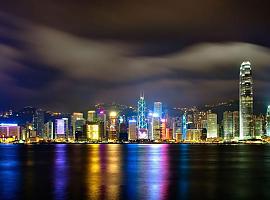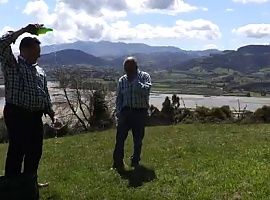El Organismo Internacional de Energía Atómica (OIEA) confirmó hoy que Japón ha elevado el grado de gravedad del accidente nuclear en la central de Fukushima Daaichi al nivel 7, el mismo que alcanzó el de Chernobyl.
El nivel 7 es el más grave en la escala internacional y evalúa la cantidad de radiactividad que ha escapado a la atmósfera, que en el caso de Fukushima Daiichi es sólo un 10% de lo que liberó el de Chernobyl.
El subdirector y jefe de Seguridad del OIEA, Denis Flory, subrayó las diferencias entre ambos accidentes.
“Uno se produjo cuando el reactor estaba funcionando, y su contenedor explotó. En Fukushima el reactor estaba apagado y el contenedor puede que haya perdido, no lo sabemos, pero sigue allí”, explicó Flory.
IAEA Briefing on Fukushima Nuclear Accident (12 April 2011, 14:30 UTC)
On Tuesday, 12 April 2011, the IAEA provided the following information on the current status of nuclear safety in Japan:
Current Situation
Overall, the situation at the Fukushima Daiichi plant remains very serious, but there are early signs of recovery in some functions such as electrical power and instrumentation.
Provisional INES Level 7 Rating
The International Atomic Energy Agency (IAEA) can confirm that the Nuclear and Industrial Safety Agency (NISA) has submitted a provisional International Nuclear and Radiological Event Scale (INES) Level 7 rating for the accident at the Fukushima Daiichi nuclear power plant. This new provisional rating considers the accidents that occurred at Units 1, 2 and 3 as a single event on INES and uses estimated total release to the atmosphere as a justification. Previously, separate provisional INES Level 5 ratings had been applied for Units 1, 2 and 3.
Japanese authorities notified the IAEA in advance of the public announcement and the formal submission of the new provisional rating
Summary of Prime Minister Kan's Press Conference on April 12
?It has been a month since the Great East Japan Earthquake hit Japan.
Once again, I wish to extend my heartfelt condolences and sympathy to those who lost their lives, their families, and those were affected by the disaster.
?A number of individuals, NPOs, and business people have voluntarily stood up to help and support the disaster victims. Many countries from all around the world have extended their kind support to us. I wish to express my heartfelt thanks for such assistance from everyone and every nation.
?One month has passed since the Great East Japan Earthquake. Now is the time for us to move on from search and rescue efforts to restoration and reconstruction efforts. Under this stage, we should not just focus on the restoration to the previous state but the creation of the new future.
?There are three principles in developing the shape of a new society that I desire under the reconstruction.
- First, create resilient local communities against natural disasters.
- Second, establish a social system that can harmonize with the global environment,
- Third, build a compassionate society that cares about people, in particular, the vulnerable.
?Moreover, my administration will forward reconstruction efforts under the following three principles.
-First, listen to requests and voices of the local community members who were affected by the disaster
-Second, gather the collected wisdom around the nation from not only politicians and bureaucrats but also scholars, private sectors, and the NPOs to tackle reconstruction efforts.
-Third, seek a future-oriented reconstruction that goes a step ahead of the dream of future.
?The Government has made an announcement to temporarily assess the ratings of the events in the Fukushima Dai-ichi nuclear plant as Level 7 based on the international scale. On the other hand, the current situation has been stabilized step by step. The total amount of discharged radioactive materials to the air has declined. I have instructed TEPCO to present its future prospects of the situation as quick as possible.
?Regarding the accidents at the Fukushima Dai-ichi nuclear power plant, I am committed to do everything I can to bring the situation of nuclear reactors and spent fuel pools under control as well as prevent further spread of damage.
?It is regrettable that the situation at the Fukushima Dai-ichi nuclear power plant has caused inconveniences to and put burdens on the residents around the nuclear plant. The Government has placed its highest priority on protecting the health of the residents. We appreciate your continued understanding and cooperation.
?The Government pledges to fully support those who were affected by the nuclear accidents until the very end including responses to the issues of housing, employment, and education.
?I’ve received messages from disaster victims such as “we can move ahead with our heads high when the entire Japan becomes vibrant,” “Stop excessive self-restraint.”
?I have a proposal. Let’s try not to put ourselves into the excessive self-restraint mood, and return to normal lifestyle while we keep giving strong compassion to the disaster victims. I believe that consuming products from the disaster-hit areas is one way to show your support to them. I call for you to cooperate in assisting the affected areas by eating and using their products.
?A large number of people were killed by the March 11 earthquake. I believe what many of them want us is not to be devastated and disparate by the disaster but to rise from the aftermath and realize the reconstruction firmly.
?We can’t pass on to our children a “sinking Japan.” What we have to do is to make utmost efforts to achieve the reconstruction so that we can feel no shame about ourselves to those who perished due to the disaster and the children who bear the future of Japan.
?The nuclear incident in Fukushima caused great concerns to the rest of the world. I think that Japan has to thoroughly verify the cause of the incident so that such accident will never happen again. At the same time, I believe we should play a major role based on our first-hand experiences from the situation when the international community sets the new safety standard for nuclear power plants.




















